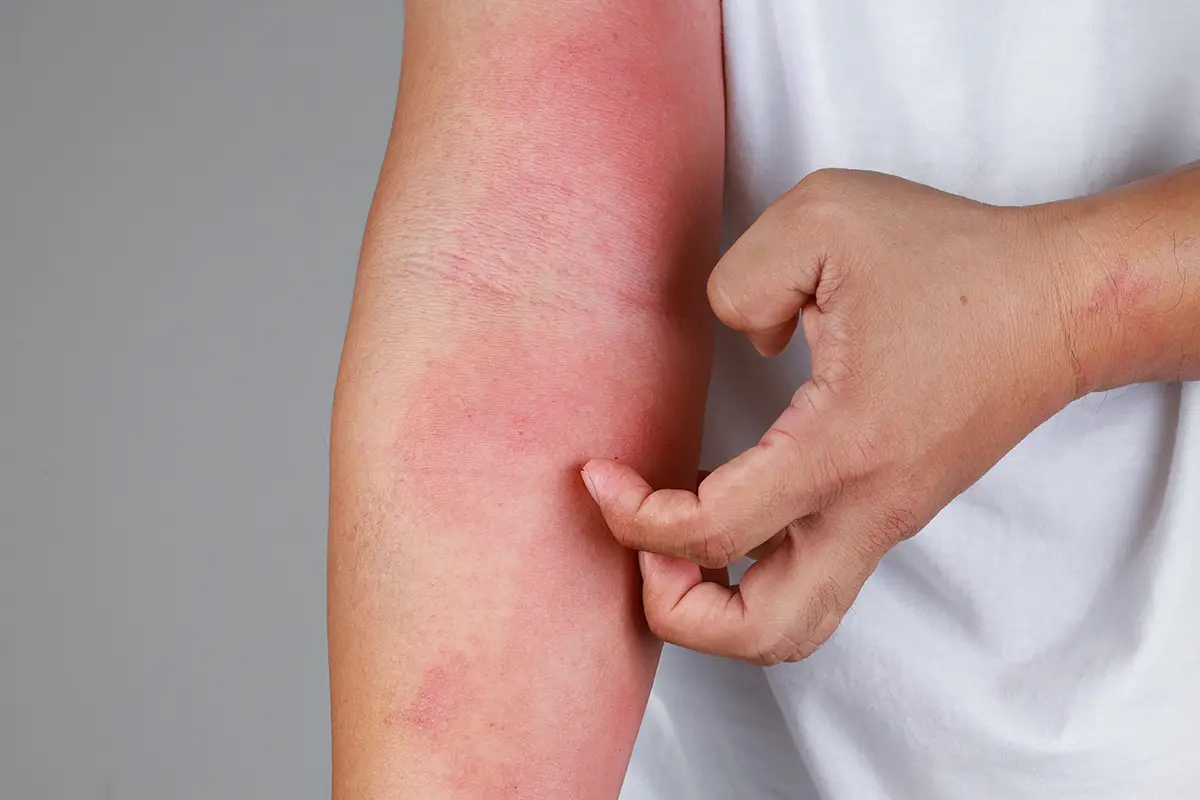Eczema is a widespread skin disorder characterized by irritated, itchy, red, and dry skin. Atopic dermatitis is another name for this skin illness. Eczema has a variety of forms. The kind of eczema you have may influence the type of rash you get and where it appears on your body.
Causes of eczema
Although eczema is a common skin illness, its cause is unknown. Though, experts believe that a hyperactive immune system could be the reason.
When your skin is exposed to external toxins, your immune system overreacts, causing eczema to flare up.
Furthermore, some individuals with eczema don’t produce sufficient protein called filaggrin, according to a study (filament aggregating protein). This protein can ensure your skin is hydrated and keeps it healthy.
Symptoms of Eczema
Eczema symptoms are often not severe. The following are the most prevalent atopic dermatitis symptoms:
- Scaly and dry skin
- Itching
- Skin flushing
- Open and crusted sores
Extensive therapy is needed for people with severe eczema to ease their symptoms. Continuous rubbing and scratching may also lead to skin illnesses.
Age group affected by Eczema
Eczema usually starts before five and can last into teenage and puberty. It may get worse for some people regularly and then goes away for a while, sometimes even years.
The peak phase of eczema is between the ages of two and four years old, though symptoms can last well into the teen years and beyond in some cases. The most affected part is the skin inside the elbows and behind the knees during the peak time of the illness. These areas are called Flexural areas.
Adult-onset eczema is a type of eczema that appears for the first time in adulthood. Middle-age and older are some of the most vulnerable years for developing adult-onset eczema. With the growing age, their skin becomes extremely dry, making them more vulnerable. In developed countries, almost 15–30% of children are affected by atopic eczema, whereas it affects 1–3% of adults.
Eczema and Mental Health
Eczema is an inflammatory skin disorder that may be connected to various types of inflammation in the body, all of which can have a negative impact on your mental health.
The symptoms of eczema often have a negative impact on a patient’s emotional well-being. Stress, tension, and anxiety may cause flare-ups, leading to even more depression and fear.
The most frequent mental health issues in persons with eczema are depression and anxiety. According to a 2017 NEA investigation, 30 % of persons are affected. Furthermore, those with eczema were four times more likely than the overall population to suffer from depression.
Research published in 2020 found that persons with eczema had a higher risk of mental health problems, with 14 % and 17 %, respectively.
Clinical studies related to Mental Health and Eczema
A 2018 study indicated that patients with Alzheimer’s disease had a much higher risk of suicidal thoughts and behaviors than the general public. This study looked at 15 research including 310,681 persons with eczema. It showed that 44% of people with eczema had higher chances of suicidal thoughts and 36% had increased chances of suicide attempts than those without eczema.
Previous studies on the psychological and mental health of patients with eczema were based mainly on small, selected dermatological samples. These studies suggest that health-related quality of life is significantly impaired in most patients with eczema, that illness-related stress is a significant problem for many patients with eczema, that psychological stress can trigger clinical signs and symptoms of eczema, and that patients with eczema have increased levels of anxiety. Stress and psychosocial impairment induced by eczema suggest underlying the observed association to increased rates of psychiatric disorders. The relationship pertains to various psychiatric diseases indicates that eczema -induced stress might trigger psychiatric symptoms or exacerbate underlying psychiatric disorders.
Factors of Mental Health Issues in Eczema
Even though eczema may impact individuals for the rest of their lives, itching and sleep disturbances – which are typically connected – are the most commonly stated reasons of disease burden by patients and caregivers, regardless of disease severity. In addition, the unpredictability of eczema flare, along with the limited capacity of presently available medications to successfully reduce itch and provide long-term disease management, corresponds with anxiety and depression symptoms, particularly in those with moderate to severe eczema.
Increased itching, worse health-related quality of life, and anxiety/depression symptoms are linked to more frequent and severe sleep disruption. The lack of predictability and control in patients’ and carers’ lives has the potential to produce secondary stress in numerous life domains and demands high levels of attention.
Healthy methods of management include social and emotional connections and leisure activities, may be impacted by various mental problems.
The impacts of eczema on other aspects of life, including social life and relaxation, are noticeable for their influence on mental health. In addition, due to peer judgment and disapproval, lack of disease acceptance, disease-related lifestyle restrictions, and, in some cases, the effects of bullying, patients with eczema, particularly affected children and teens, may experience self-esteem issues and mental health consequences.
References
https://nationaleczema.org/mental-health-science/
https://www.verywellhealth.com/most-common-location-for-eczema-82720#:~:text=Eczema%20tends%20to%20reach%20a,are%20known%20as%20flexural%20areas.
https://www.healthline.com/health/eczema#causes
https://www.medicalnewstoday.com/articles/14417#symptoms
https://onlinelibrary.wiley.com/doi/abs/10.1111/j.1365-2133.2009.09309.x
https://www.healthline.com/health/eczema/the-link-between-eczema-and-mental-health#depression-and-anxiety
https://onlinelibrary.wiley.com/doi/abs/10.1111/j.1365-2133.2009.09309.x
